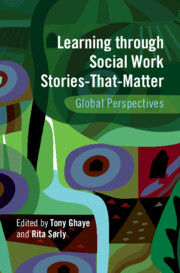Refine search
Actions for selected content:
56 results
Zones of Slow Death? Social Descent, Epistemic Injustice and Temporality
-
- Journal:
- Business Ethics Quarterly , First View
- Published online by Cambridge University Press:
- 21 November 2025, pp. 1-23
-
- Article
-
- You have access
- Open access
- HTML
- Export citation
When Philosophy Meets the Street: Lived Experience and Epistemic Recognition in Field-Based Philosophy
- Part of
-
- Journal:
- Public Humanities / Volume 1 / 2025
- Published online by Cambridge University Press:
- 12 November 2025, e157
-
- Article
-
- You have access
- Open access
- HTML
- Export citation
A New Direction for Epistemic Injustice in Business
-
- Journal:
- Business Ethics Quarterly , First View
- Published online by Cambridge University Press:
- 23 October 2025, pp. 1-26
-
- Article
-
- You have access
- Open access
- HTML
- Export citation
The Burden of Engagement: Rethinking Epistemic Friction through LGBTQIA+ Experience
-
- Journal:
- Episteme , First View
- Published online by Cambridge University Press:
- 16 October 2025, pp. 1-15
-
- Article
-
- You have access
- Open access
- HTML
- Export citation
Chapter 24 - “I Was So Tired of All the Words”
- from Part II - Lenses and Lessons
-
-
- Book:
- Learning through Social Work Stories-That-Matter
- Published online:
- 28 August 2025
- Print publication:
- 11 September 2025, pp 344-360
-
- Chapter
- Export citation
Collective Amnesia as an Epistemic Injustice
-
- Journal:
- Episteme , First View
- Published online by Cambridge University Press:
- 08 September 2025, pp. 1-21
-
- Article
-
- You have access
- Open access
- HTML
- Export citation
Against Epistemic Harm
-
- Journal:
- Episteme , First View
- Published online by Cambridge University Press:
- 29 August 2025, pp. 1-21
-
- Article
-
- You have access
- Open access
- HTML
- Export citation

Learning through Social Work Stories-That-Matter
- Global Perspectives
-
- Published online:
- 28 August 2025
- Print publication:
- 11 September 2025
Chapter 3 - Broken Narratives
-
- Book:
- Healing and the Invention of Metaphor
- Published online:
- 17 July 2025
- Print publication:
- 31 July 2025, pp 61-85
-
- Chapter
- Export citation
18 - Right to Be Angry
- from Part IV - Exploring Negative Consequences of Diagnosing Personality Disorder
-
-
- Book:
- Conceptualizing Personality Disorder
- Published online:
- 25 June 2025
- Print publication:
- 10 July 2025, pp 315-332
-
- Chapter
- Export citation
Self-fulfilling testimonial injustice
-
- Journal:
- Episteme , First View
- Published online by Cambridge University Press:
- 08 July 2025, pp. 1-24
-
- Article
-
- You have access
- Open access
- HTML
- Export citation
3 - The Social Life of Clothing
-
- Book:
- A Philosopher Looks at Clothes
- Published online:
- 08 May 2025
- Print publication:
- 05 June 2025, pp 57-78
-
- Chapter
- Export citation
4 - Equality
- from Part I - Values
-
-
- Book:
- The Cambridge Handbook of Constitutional Theory
- Published online:
- 27 March 2025
- Print publication:
- 24 April 2025, pp 56-70
-
- Chapter
- Export citation
Decolonial Epistemic Authority Reparations
-
- Journal:
- Episteme , First View
- Published online by Cambridge University Press:
- 04 April 2025, pp. 1-15
-
- Article
-
- You have access
- Open access
- HTML
- Export citation
Toxic Positivity and Epistemic Injustice
-
- Journal:
- Episteme , First View
- Published online by Cambridge University Press:
- 27 March 2025, pp. 1-17
-
- Article
-
- You have access
- Open access
- HTML
- Export citation
“It Feels Like White Supremacy Losing Control”: Gleaning Local Perspectives on “Anti-Woke” Legislation
-
- Journal:
- Journal of Race, Ethnicity and Politics / Volume 10 / Issue 2 / July 2025
- Published online by Cambridge University Press:
- 26 March 2025, pp. 603-631
-
- Article
-
- You have access
- Open access
- HTML
- Export citation
Chapter 39 - “I Wish I Could Be Like a Tree”
-
-
- Book:
- Pillars of Developmental Psychology
- Published online:
- 14 February 2025
- Print publication:
- 20 February 2025, pp 445-457
-
- Chapter
- Export citation
Chapter 2 - Thriving within Ourselves: Epistemic Injustice and Individual Wellness
-
-
- Book:
- How People Thrive
- Published online:
- 14 November 2024
- Print publication:
- 21 November 2024, pp 37-64
-
- Chapter
- Export citation
Non-ideal theory in the philosophy of religion: Exploring implications of non-ideal theorising for the problem of evil
-
- Journal:
- Religious Studies , First View
- Published online by Cambridge University Press:
- 06 November 2024, pp. 1-16
-
- Article
-
- You have access
- Open access
- HTML
- Export citation
The epistemic injustice of borderline personality disorder
-
- Journal:
- BJPsych International / Volume 21 / Issue 4 / November 2024
- Published online by Cambridge University Press:
- 13 May 2024, pp. 78-82
- Print publication:
- November 2024
-
- Article
-
- You have access
- Open access
- HTML
- Export citation
